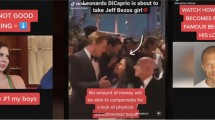Abstract
This article focuses on the blogosphere as an oppositional field where the meanings around contemporary Western women's singlehood are contested, negotiated and rewritten. In contrast to dominant narratives in which single women are pathologised, in the blogs by, for, and about single women analysed here, writers aim to refigure women's singleness as well as providing resources, support and a textual community where others can intervene and contribute to the re-valuation of single women. These blogs also function as alternative forms of knowledge, seeking to (re)legitimise women's singleness and to trouble their aberrance and social liminality. Rather than only considering the form in isolation from its content, this article analyses the discourses deployed by bloggers and within blogs and how women bloggers publicly perform their very singleness as part of a personal and political strategy of re-signification. In this way, while cautious not to overestimate the democratic potentialities of the so-called blogosphere, it underscores the important cultural – and indeed political – work being undertaken by single women therein. Moreover, by demonstrating how these blogs use discursive tactics commonly associated with feminism's second-wave – women's consciousness-raising; identity politics; deploying and reiterating the famous feminist dictum: ‘the personal is political’; naming discrimination; and empathy and community-building – it argues that they are using so-called ‘new’ media for what is now problematically believed to be ‘old’ (feminist) politics.
Similar content being viewed by others
Notes
My use of this term is consistent with McRobbie's (2009), that is, post-feminism both takes account of feminism – presuming its work has been done – and performs its disavowal.
http://www.singlutionary.blogspot.com/, last accessed 28 March 2011
First Person Singular's Wendy Braitman, http://firstpersonsingular.org/, last accessed 28 March 2011.
Living Single's Bella DePaulo, http://www.psychologytoday.com/blog/living-single, last accessed 28 March 2011.
For further analysis of how single women are positioned and pathologised in mainstream media culture, see Taylor (2011, forthcoming), Single Women in Popular Culture, (Palgrave Macmillan). This article is based on Chapter Six of that work; I am grateful to Palgrave Macmillan for their permission to use this material.
Onely, http://www.onely.org/; Single Women Rule, http://www.singlewomenrule.com/; Quirkyalone, http://www.quirkyalone.net/, last accessed 28 March 2011.
See Ringrose & Walkerdine's (2008) work on how the borders of certain subject positions are policed under neoliberalism, making some appear more ‘inhabitable’ than others.
http://onely.org/2009/10/07/another-reason-institutionalized-couplehood-sucks/, last accessed 28 March 2011.
30 July 2009, http://onely.org/2009/07/30/reality-tv-idea-1-i-complete-me/, last accessed 28 March 2011
8 September 2009, http://www.psychologytoday.com/blog/living-single/200909/singles-tv-what-s-the-story, last accessed 28 March 2011.
29 September 2008, http://onely.org/2008/09/29/get-out-the-onely-vote, last accessed 28 March 2011.
‘Singles, Go Vote!’, 5 February 2008, http://singletude.blogspot.com/2008/02/singles-go-vote.html; accessed 31st March 2011 see also Sololady's ‘Single Women Must Vote!!’, 4 January 2008, http://www.sololady.com/blogs.aspx?blogid=187, last accessed 31 March 2011.
19 and 28 March 2008, http://singletude.blogspot.com/2008/03/tax-tips-for-single-filers-part-i.html, last accessed 28 March 2011.
18 March 2008, http://singletude.blogspot.com/2008/03/singles-penalty-tax-code-discrimination.html, last accessed 28 March 2011.
e.g., ‘The High Price of Being Single’, 5 October 2009, http://www.psychologytoday.com/blog/living-single/200910/the-high-price-being-single, last accessed 31 March 2011.
Original emphasis, 21 September 2008, http://www.rabe.org/overcoming-singlism/, last accessed 30 March 2011.
See Reynolds for a consideration of women's singleness and identity politics (2008: 153).
31 March 2009, http://www.singlewomenrule.com/2009/03/sisters-in-the-struggle-single-women-blog-up/, last accessed 28 March 2011.
http://onely.org/2009/09/18/better-than-a-pub-crawl-national-singles-week-blog-crawl/, last accessed 28 March 2011.
http://www.singlewomenrule.com/about/.
31 March 2009, http://www.singlewomenrule.com/2009/03/sisters-in-the-struggle-single-women-blog-up/, last accessed 28 March 2011.
30 July 2009, Onely, http://onely.org/2009/07/27/more-on-marriage/, last accessed 28 March 2011.
http://www.rabe.org/about/my-story/, last accessed 30 March 2011.)
Onely, 11 October 2009, http://onely.org/the-practice-of-being-onely/, last accessed 28 March 2011.
References
Budgeon, S. (2006) ‘Friendship and formations of sociality in late modernity: the challenge of “post traditional intimacy”’ Sociological Research Online, Vol. 11, No. 3.
Budgeon, S. (2008) ‘Couple culture and the production of singleness’ Sexualities, Vol. 11, No. 3: 301–325.
Bruns, A. (2006) ‘Introduction’ in Bruns, A. and Jacobs, J. (2006) editors, The Uses of Blogs, New York: Peter Lang.
Cohen, K. (2006) ‘A welcome for blogs’ Continuum, Vol. 20, No. 2: 161–173.
Coleman, S. (2005) ‘Blogs and the politics of listening’ Political Quarterly, Vol. 76, No. 2: 273–280.
Cullen, R. (2001) ‘Addressing the digital divide’ Online Information Review, Vol. 25, No. 5: 311–320.
De Paulo, B. (2006) Singled Out: How Singles are Stereotyped, Stigmatised, and Ignored, and Still Live Happily Ever After, New York: St Martin's Griffin.
Douglas, S. (2010) Enlightened Sexism: The Seductive Message that Feminism's Work is Done, New York: Times Books.
Fitzpatrick, K. (2007) ‘The pleasure of the blog: the early novel, the serial and the narrative archive’ in Burg, T. and Smidt, J. (2007) editors, Blog Talks Reloaded, Norderstedt: Books on Demand: http://www.plannedobsolescence.net/wp-content/files/fitzpatrickblogtalk.pdf, last accessed 15 July 2011.
Giddens, A. (1991) Modernity and Self Identity: Self and Society in the Late Modern Age, Cambridge: Polity.
Gokulsing, K.M. and Dissanayake, W. (2009) Popular Culture in a Globalised India, London: Routledge.
Grant, L. (1993) Fundamental Feminism, London: Routledge.
Gurak, L.J. and Antonijevic, S. (2008) ‘The psychology of blogging: you, me, and everyone in between’ American Behavioral Scientist, Vol. 52, No. 1: 60–68.
Henry, A. (2004) Not My Mother's Sister: Generational Conflict and Third Wave Feminism, Boston: University of Indiana Press.
Hermes, J. (1995) Reading Women's Magazines, Cambridge: Polity.
Herring, S.C., Kouper, I., Scheidt, L.A. and Wright, E.L. (2004) ‘Women and children last: the discursive construction of weblogs’ in Gurak, L.J., Antonijevic, S., Johnson, L., Ratliff, C. and Reyman, J. (2004) editors, Into the Blogosphere: Rhetoric, Community, and Culture of Weblogs. http://blog.lib.umn.edu/blogosphere/women_and_children.html.
Hindman, M. (2009) The Myth of Digital Democracy, Princeton: Princeton University Press.
Hodkinson, P. (2007) ‘Interactive online journals and individualization’ New Media and Society, Vol. 9, No. 4: 625–650.
Hogeland, L. (1998) Feminism and Its Fiction: The Consciousness Raising Novel and the Women's Liberation Movement, Philadelphia: University of Pennsylvania Press.
Karlsson, L. (2006) ‘Acts of reading diary weblogs’ HUMAN IT, Vol. 8, No. 2: 1–59.
Karlsson, L. (2007) ‘Desperately seeking sameness’ Feminist Media Studies, Vol. 7, No. 2: 137–153.
Lopez, L.K. (2009) ‘The radical act of “mommy blogging”: redefining motherhood through the blogosphere’ New Media and Society, Vol. 11: 729–747.
Loewenstein, A. (2008) The Blogging Revolution, Carlton: Melbourne University Press.
Marshall, P.D. (1997) Celebrity and Power, Minneapolis: University of Minnesota Press.
McNeil, L. (2003) ‘Teaching an old genre new tricks: the diary on the internet’ Biography, Vol. 26, No. 1: 24–47.
McRobbie, A. (2009) The Aftermath of Feminism, London: Sage.
Meehan, J. editor (1995) Feminists Read Habermas: Gendering the Subject of Discourse, London: Routledge.
Pearce, L. (2003) The Rhetorics of Feminism, London: Routledge.
Plummer, K. (1995) Telling Sexual Stories, London: Routledge.
Perlmutter, D. (2008) Blogwars: The New Political Battleground, New York: Oxford University Press.
Reynolds, J. (2008) The Single Woman: A Discursive Analysis, London: Routledge.
Reynolds, J. and Wetherell, M. (2003) ‘The discursive climate of singleness: the consequences for women's negotiation of a single identity’ Feminism and Psychology, Vol. 13, No. 4: 498–510.
Ringrose, J. and Walkerdine, V. (2008) ‘Regulating the abject: The TV Make-Over as Site of Neoliberal Reinvention Towards Bourgeois Femininity’ Feminist Media Studies, Vol. 8, No. 3: 227–246.
Serfaty, V. (2004a) ‘From self-explanation to self-justification: online diaries and blogs in America’ Recherches Anglaises et Nord-Américaines (RANAM), Université Marc Bloch, Vol. 37, No. Octobre: 247–256.
Serfaty, V. (2004b) ‘Online diaries: towards a structural approach’ Journal of American Studies, Vol. 38: 457–471.
Serfaty, V. (2004c) The Mirror and the Veil: An Overview of Online Diaries and Blogs, Amsterdam: Rodophi.
Smith, S. and Watson, J. (1996) Getting a Life: Everyday Uses of Autobiography, Minneapolis: University of Minnesota Press.
Sorapure, M. (2003) ‘Screening moments, scrolling lives: diary writing on the web’ Biography, Vol. 26, No. 1: 1–23.
Taylor, A. (2011, forthcoming) Single Women in Popular Culture: The Limits of Postfeminism, Basingstoke: Palgrave Macmillan.
Travers, A. (2003) ‘Parallel subaltern counterpublics in cyberspace’ Sociological Perspectives, Vol. 46, No. 2: 223–237.
Tremayne, M. editor (2007) Blogging, Citizenship, and the Future of Media, New York: Routledge.
Turner, G. (2006) ‘The mass production of celebrity: “celetoids”, reality TV and the “demotic turn”’ International Journal of Cultural Studies, Vol. 9, No. 2: 153–165.
Turner, G. (2010) Ordinary People and the Media: The Demotic Turn, London: Sage.
van Dijck, J. (2004) ‘Composing the self: of diaries and lifeblogs’, The Fibreculture Journal, Issue 3.
Wei, L. (2009) ‘Filter blogs vs. personal journals: understanding the knowledge production gap on the internet’ Journal of Computer-Mediated Communication, Vol. 14: 532–558.
Willis, S. and Tranter, B. (2006) ‘Beyond the “digital divide”: internet diffusion and inequality in Australia’ Journal of Sociology, Vol. 42, No. 1: 43–59.
Wood, E.A. (2008) ‘Consciousness-raising 2.0: sex blogging and the creation of a feminist sex commons’ Feminism and Psychology, Vol. 18, No. 4: 480–487.
Young, S. (1997) Changing the Wor(l)d: Discourse, Politics and the Feminist Movement, London: Routledge.
Youngs, G. (2009) ‘Blogging and globalization: the blurring of the public/private spheres’ Aslib Proceedings: New Information Perspectives, Vol. 61, No. 2: 127–138.
blog addresses
Living Single, http://www.psychologytoday.com/blog/living-single, last accessed 28 March 2011.
Onely: Single and Happy, http://onely.org/, last accessed 28 March 2011.
Quirkyalone, http://www.quirkyalone.net/, last accessed 29 March 2011.
Rachel's Musings, http://www.rabe.org/about/, last accessed 30 March 2011.
Single and Thirty Something, http://singlethirtysomethingwordpress.com/, last accessed 28 March 2011.
Single Women Rule, http://singlewomenrule.com/, last accessed 28 March 2011.
Singletude, http://singletude.blogspot.com/, last accessed 31 March 2011.
Singlutionary, http://singlutionary.blogspot.com/, last accessed 28 March 2011.
Sixty and Single in Seattle, http://marysreallife.blogspot.com/, last accessed 28 March 2011.
Solo Lady, http://www.sololady.com/, last accessed 29 March 2011.
The Spinster Chronicles, http://spinningleese.blogspot.com/, last accessed 31 March 2011.
Rights and permissions
About this article
Cite this article
Taylor, A. blogging solo: new media, ‘old’ politics. Fem Rev 99, 79–97 (2011). https://doi.org/10.1057/fr.2011.33
Published:
Issue Date:
DOI: https://doi.org/10.1057/fr.2011.33




